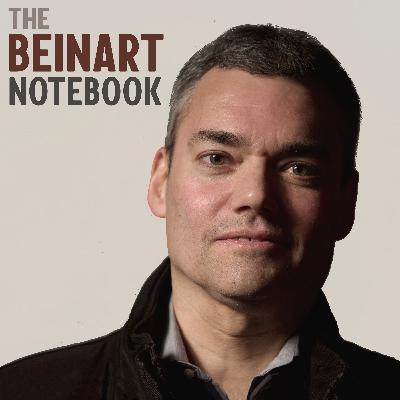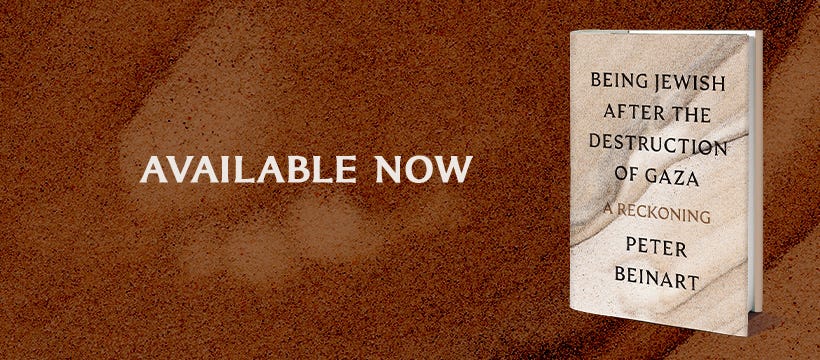Je Ne Suis Pas Charlie
Description
An Auction to Support the People of Gaza
WEDNESDAY Zoom Call
This week’s Zoom call will be at a special time, WEDNESDAY at 1 PM Eastern. Our guest will be Avrum Burg, the former speaker of the Knesset, who has been using traditional Jewish religious forms in remarkable ways to challenge the genocide in Gaza. He has authored a poem entitled, “If God Were in the Heavens of Gaza” and a Kaddish “for the blessed memory of all innocent” victims. He will read them during our Zoom call, and we will discuss, in these days leading up to Rosh Hashanah and Yom Kippur, how Jews can repent for our complicity in the horror being committed in our name.
Ask Me Anything
Our next Ask Me Anything session, for premium subscribers, will be this Tuesday, September 16, from 1-2 PM Eastern time.
Cited in Today’s Video
Bari Weiss on “Je Suis Charlie.”
Bari Weiss on overcoming “Trump derangement syndrome.”
Things to Read
(Maybe this should be obvious, but I link to articles and videos I find provocative and significant, not necessarily ones I entirely agree with.)
In Jewish Currents (subscribe!), Sean Pergola reflects on the Los Angeles Holocaust Museum’s apology for saying “’Never Again’ Can’t Only Mean Never Again For Jews.”
Sam Adler-Bell on how former Biden officials are spinning their actions on Gaza.
Nadine Apelian Dobbs on a story of Palestinian survival.
Daniel Levy on how Israel’s disengagement from Gaza laid the foundation for the current genocide.
How many Democrats does New York Senator Kirsten Gillibrand know?
I was the subject of a profile in Haaretz’s magazine
See you on WEDNESDAY,
Peter
VIDEO TRANSCRIPT:
So, in the wake of the terrible murder of Charlie Kirk, I was struck by this tweet by Bari Weiss. And Bari Weiss writes, ‘whether you agree with him or not is completely, utterly, totally beside the point. We won’t do it. Je suis Charlie.’ That’s a kind of reference to the newspaper Charlie Hebdo, the French newspaper, where there were these terrible murders 10 years ago by people supposedly upset by the kind of the cartoons that the newspaper was doing of the prophet Muhammad. And Bari Weiss, as I understand it, is suggesting here that there’s something wrong with saying in the wake of Charlie Kirk’s murder that you think that some of his political views were reprehensible, that somehow that detracts from your opposition to his murder. This doesn’t seem to me to make any sense whatsoever.
I think it’s obvious that the killing of Charlie Kirk was horrifying, that that person should be put in jail. They should be punished to the full extent of the law. No matter what someone’s political views, you absolutely have no right to resort to violence. It’s a horror for his family and all the people who cared about him. It’s just absolutely fundamentally wrong. But just because something that was fundamentally wrong was done to someone—a crime—doesn’t mean that when discussing that person’s legacy, you can’t talk about their political views. And the suggestion in this case, that Bari Weiss thinks that that conversation is illegitimate, I think is really quite revealing, right, about what she actually thinks about Charlie Kirk.
Because let’s imagine, God forbid, that Rashida Tlaib were assassinated or Zohran Mamdani were assassinated. I think it’s really hard to imagine that Bari Weiss would be tweeting, you know, je suis Rashida, je suis Zohran. Of course, she wouldn’t. She would say that the murders were wrong, but she would not think it was illegitimate in any way to talk about the fact that their political views in her mind were ones that she fundamentally opposed, right?
Or to take a different side of the ideological spectrum, let’s think about the assassination many years ago of the racist Israeli politician, Meir Kahane, who was assassinated, right? And that was wrong. He should not have been assassinated. That was a crime, right? But I think, I would hope no one would have responded to that by saying, je suis Meir, right? As if to say, I’m going to embrace everything about Meir Kahane simply because he was killed, right? You should be able to say, it’s wrong that he was killed. That person should be prosecuted under the law. And the man also had reprehensible racist views.
And I don’t think Bari Weiss would have difficulty understanding that whatsoever if it was someone whose political views they really disagreed with. And here, I think, is really the critical point here, right, is that Charlie Kirk, among many other things, was someone who very actively supported Donald Trump’s efforts to overturn the 2020 election. He even organized to send buses of people to the rally that attacked the Capitol in trying to overthrow that democratic election. Charlie Kirk was therefore fundamentally an opponent of liberal democracy in the United States. When you try to overthrow free elections in the United States, you’re declaring war on American democracy.
Again, to say it again and again and again, of course, it doesn’t mean that by any means he should have been killed. Of course not. The person who killed him should be punished. But the point is that what Bari Weiss is really saying when she says, je suis Charlie, is she’s saying that she doesn’t really think that’s important. She doesn’t think there’s anything about what Charlie Kirk believed that actually really bothers her.
And this reflects, I think, a really chilling and fundamental shift. There was a time when Bari Weiss and many other people like Bari Weiss in the kind of political center, people who came out of the kind of, you know, kind of center-right, the kind of, you know, I think it was never Trump conservatives, recognized that Donald Trump and people who supported him were fundamentally their ideological antagonists, no matter what they might have agreed upon, because they were threatening liberal democracy in the United States. And now you have Bari Weiss, and she’s not the only one, but she’s, I think, one of the most significant of these people who said a few years ago that she’s gotten over her Trump derangement syndrome, right. Why? Because she said that she was impressed during his first time by his policies in the Middle East, and she thought the economy was good. And so now she’s not going to practice Trump derangement syndrome anymore.
But it seems to me the truly deranged thing is to look at what Donald Trump is now doing and be less concerned than you were in his first term because his attack on the basic structure of liberal democracy in the United States is simply escalating. And Charlie Kirk was a part of that. And to say, je suis Charlie, is essentially to say, you don’t think that’s really important. It’s not important enough to be willing to speak about in assessing the legacy of Charlie Kirk.
And I think this is really part of what’s so fundamentally terrifying about this moment is we have so many people in positions of real authority now who at one point were willing to say that even though they might agree with Donald Trump on certain things, they might have right-leaning ideas on certain things, that he was fundamentally illegitimate because he fundamentally did not respect the rules of the American democratic system as exhibited on January 20, 2021, and in so many ways since. Even to this day, he’s talking about how basically mail-in ballots are not legitimate, that that’s rigged, that he’s kind of laying the groundwork potentially for not respecting the results of the midterm elections in 2026.
And you have people like Bari Weiss who are essentially saying that that’s no longer important to them in the way they make political judgments. And that’s why they can essentially say ideologically, there’s nothing so disturbing about Charlie Kirk that they think it’s worth talking about. If you don’t think it’s worth talking about Charlie Kirk’s support for the effort to overthrow a democratic election, you’re really saying that you don’t think the defense of liberal democracy in the United States is important. And I fear that a lot of powerful people have moved to that position as Donald Trump has emerged ascendant after his election victory last fall. And it makes me really terrified, really, about the future of liberal democracy in the country.
This is a public episode. If you'd like to discuss this with other subscribers or get access to bonus episodes, visit peterbeinart.substack.com/su

















